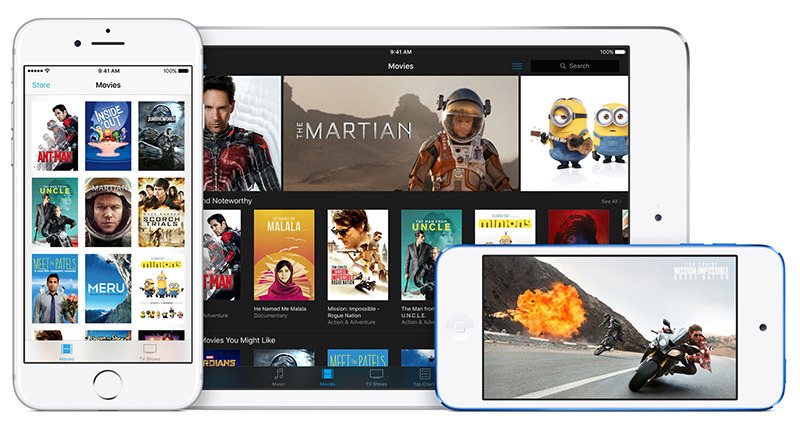Facing increased competition from the likes of Amazon and Comcast, Apple's once commanding market share lead in the online video sales and rental industry has been more than halved, according to a new report.
Citing Hollywood studio sources, The Wall Street Journal on Sunday said Apple's share for selling and renting movies, as well as other video content, has dropped to between 20 percent and 35 percent, down from over 50 percent as recently as 2012.
The steep decline comes as competitors Amazon and Comcast enjoy market share gains on the back of aggressive industry moves.
Amazon, for example, saw its share of the overall video business grow to around 20 percent, studio executives claim. The online retail giant markets its digital wares through the Amazon Prime subscription service, as well as individual sales and rentals marketed through Amazon Video.
Comcast, the nation's largest cable provider, boosted its stake in the market to 15 percent after it starting selling digital movies and television shows to customers in 2013, the report said. Like other cable companies, Comcast has for decades rented video content to customers.
Interestingly, the loss of market share is not uniform across genres, the report said. For example, iTunes is a top distributor of independent movies, as Apple promotes and signs exclusive deals for films made outside of the traditional movie studio system, sources said.
When reached for comment, an unnamed Apple spokeswoman did not dispute the figures provided to WSJ, but noted iTunes movie sales and rentals increased over the past year and are now at their highest point in more than a decade. She went on to say that Apple is also focusing on delivering content to customers via subscription services like Netflix and HBO.
While the report's numbers seemingly conflict with Apple's claims of growth, WSJ explains the combined market is on the rise. According to estimates from PricewaterhouseCoopers, U.S. digital movie rentals and sales rose 12 percent to $5.3 billion in 2016. Whether that accounts for iTunes' annual growth, but supposedly steep decline in market share, is unclear.
The report also cites estimates from Bernstein Research, which claims iTunes video, music, book and magazine sales generated $4.1 billion in revenue.
Also impacting iTunes' performance are streaming companies. The rise of subscription-based services like Amazon Prime and Netflix contributed to a decline in video-on-demand rental revenue, which according to PricewaterhouseCoopers dropped 4 percent to $1.8 billion last year. Movie sales also suffered a slowdown, with purchase revenues growing 21 percent to hit $3.5 billion last year as compared to a 29 percent year-over-year bump the year prior.
The news comes as Apple looks to grow its booming services business, which includes iTunes, iCloud, Apple Music, Apple Pay, Apple Care and the various App Stores. The sector generated $7.04 billion during Apple's second fiscal quarter of 2017, up from $5.99 billion in the same period last year. CEO Tim Cook has said on multiple occasions that services is on track to generate revenues equivalent to a Fortune 100 company by the end of 2017.
 Mikey Campbell
Mikey Campbell







-m.jpg)






 Chip Loder
Chip Loder
 Wesley Hilliard
Wesley Hilliard
 Marko Zivkovic
Marko Zivkovic

 Christine McKee
Christine McKee
 Amber Neely
Amber Neely

 Malcolm Owen
Malcolm Owen








54 Comments
Really not surprising given the increased options. I either stream on Netflix or Prime. But if I buy a movie digitally, I use iTunes. I only own maybe 10. I got suckered into "Steve Jobs" thinking it would be great, and I didn't like it at all. Should have rented it!
The story is basically the same one we've heard in every market in which Apple participates. That being, Apple's sales are not growing as fast as the overall market. What's new? I'll bet Coach sales have rarely grown as fat as the overall handbag market. All markets have segments, and the growth in the lower-priced, commoditized segments is almost always faster than the higher-priced premium segments. No surprise there. wheres the money being made, and is Apple profiting handsomely in its segment, while growing? Thosecare the questions to ask.
On a side note, it seems Wall St likes to anchor on all the wrong things. For example, if a company [Apple], participates in a market, Wall St myopically measures its success by focusing on just that one market, and usually the wrong metrics of true success (profit would be where I'd start, rarely where Wall St starts). And what about measuring against other businesses. If I own a coffee shop that does half as well as Starbucks, but three times as well as any other business in my neighborhood, guess what... I made a good decision to start a coffee shop rather than a hat store. Apple is a better business than KO or AMZN, once you back up and look down from the 10,000' height. And yet, bizarrely, it's assigned a significantly lower valuation than either.
Not surprising at all. AppleTV has become an utterly dated, mediocre product -- I barely use it anymore, except to listen to my music on the cloud. Our cable provider, Comcast, has really upped its game. I can watch pretty much anything I need -- movies, TV shows -- on any of my devices, not to mention my TV. Often I check for shows on Comcast first, since it searches across every content provider and tells me when stuff is free on HBO, Showtime, Netflix, Starz, etc., stuff that Apple would charge me for; i.e., it does a good-enough 'universal' search.
Apple has essentially surrendered the TV/movie game to its competitors. When Cook makes a statement like 'AppleTV is the future of television,' it sounds laughable, actually. I can't believe he can say that with a straight face. Eddy Cue has been been pathetic in his role, and has not served Apple well. It's amazing that's he's still around.
I think piracy is still the main issue in the movie/TV market. For me, too much of the content is too expensive to just impulse buy, especially without being sure you will enjoy it. If Amazon & Netflix can supply so much content for $10/month - I don't see why Hollywood can't sort themselves out.
I think there has been a huge drop due to illegal movie downloads using Kodi on Firesticks. Sounds a lot like the loss of our book stores.